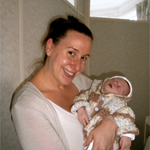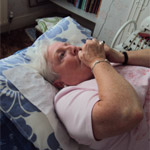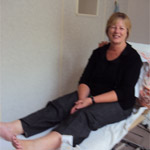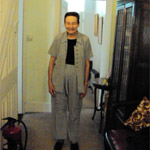Fibromyalgia and chronic pain – could Osteopathy and Acupuncture help?
According to the NHS, around one in 20 people* may be affected by Fibromyalgia, which is an agonising, chronic condition which is notoriously difficult to diagnose.
Most common in young to middle aged women; there is sadly no cure, although the symptoms can be controlled to make daily life easier.
The exact cause of this debilitating condition is unknown. But researchers believe it may be related to chemicals in the brain, plus there could be a genetic predisposition.
Often, it is triggered by a stressful physical or emotional event, like the death of a loved one, the breakdown of a relationship or an operation or physical injury.
Famous sufferers of Fibromyalgia include Lady Gaga. In an interview with Vogue, she said of the illness: “Chronic pain is no joke. And it’s every day waking up not knowing how you’re going to feel.”
Symptoms of Fibromyalgia
Fibromyalgia is characterised by generalised and often heightened pain in the muscles and tendons of the body.
Diagnostic criteria list up to 18 symmetrical tender points on the body but in fact the condition often includes a wide range of associated signs and symptoms, such that it is often referred to as a Fibromyalgia Syndrome.
These include:
- Fatigue
- Sleep disturbance
- Temperature dysregulation e.g. Raynauds
- IBS
- Irritable bladder
- Depression/anxiety
- Poor memory/attention span
- Headache, dizziness, occipital pain
- Mechanical low back pain
- Sciatic pain
There is significant co-occurrence of Fibromyalgia with hypothyroidism (under active thyroid), rheumatoid arthritis, lupus and scleroderma.
One uniting feature of the symptoms of Fibromyalgia is that they can be associated with poor regulation in the autonomic nervous system of the body.
Onset of Fibromyalgia is often associated with prolonged stress and poor sleep. These prevent the body from repairing and healing in the normal way and can trigger a “cascade” of the above symptoms as the body’s normal regulatory mechanisms gradually go awry.
Why it’s hard to diagnose
The problem is: there is no single definitive test for Fibromyalgia. And due to the list of varying symptoms, it is often hard to get a diagnosis. In fact, one review suggests that it could take up to four years to diagnose.
“I often find that patients suffering with Fibromyalgia feel as though they are not being listened to,” Osteopath Denise Callaghan explains. “Before they visit my Bromley-based clinic they have often sought help from their GP, where they would have described their list of symptoms and had various tests done — but in most cases, the results come back all clear.”
“This can leave the patient feeling a number of things,” Denise continues. “From confusion and self-doubt to invalidation. But as an Osteopath, I know that every body and everybody is different and just because nothing shows up on your blood tests or scans, it doesn’t mean to say that you are not suffering.
“I have written before about having a disproportionate response to injury. And Fibromyalgia is no different. Symptoms can differ from person to person and fluctuate over time.”
How Osteopaths can help
Osteopaths may be able to help with both diagnosis and treatment of Fibromyalgia. A thorough osteopathic case history will allow us to understand the range of symptoms and, through assessment of movement and gentle touch, the Osteopath will be able to gauge the state of the tissues and how to treat appropriately for relief of symptoms.
Osteopaths are highly aware of the role of the autonomic nervous system in health and illness and have many gentle and effective ways of interacting with it to rebalance neurological tone and stimulate the healing process.
There’s more
But along with more than 35 years’ experience as an Osteopath, Denise is a registered member of the British Acupuncture council and the British Medical Acupuncture Council, after training with experts in China, the birthplace of Acupuncture. So Denise can strive to help with Fibromyalgia pain through the use of this complementary or alternative medicine.
“Acupuncture involves penetrating acupuncture points through the skin using and manipulating thin needles to improve the body’s energy flow or ‘qi’, maintaining overall health and vitality,” Denise explains. “In traditional Chinese medicine, it is used for treating chronic pain.”
More research is needed, but studies suggest that there is ‘increasing evidence’ to show that the use of acupuncture as an adjunct to exercise, physical therapy, or pharmacological treatment, could be used as part of a multi-modality treatment plan for fibromyalgia.
If you, or someone you know has been diagnosed with Fibromyalgia or is suffering from any of the symptoms listed above then why not book an appointment? Denise Callaghan has more than 35 years’ experience in the field and has worked with a number of Fibromyalgia patients in this time.
*https://www.nhs.uk/conditions/fibromyalgia/





















